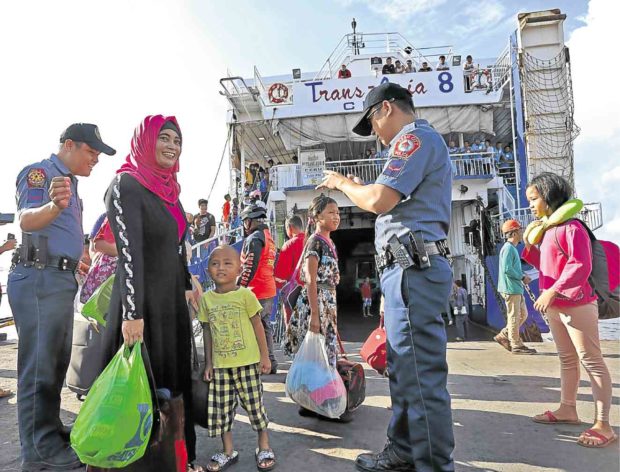
Families rescued from Marawi City arrive at Pier 5 in Cebu City where they were processed before boarding a city government-owned bus.—JUNJIE MENDOZA/CEBU DAILY NEWS
The war in Marawi City rudely interrupted the vacations of Alaina Macabato and Salma Abdulla, Muslims and natives of Marawi who teach at the Madrasah Education Program in a public school in Cebu City.
It cut short a phone conversation between Pfc. Kevin Sisiban and his 94-year-old grandfather in Cotabato City, their last.
It cost Somaya Palao and her family P8,000 for a normally two-hour trip from Marawi to Iligan City that took eight hours.
Their stories were now among countless emerging from the siege of Marawi by Islamic State followers and the ongoing operation by the armed forces to finish them off.
Macabato and Palao went to Marawi to celebrate Ramadan there when the terrorists struck. They are now among 62 people who were rescued in Marawi and brought to Cebu City from Iligan City.
Safety
It was the call of duty that brought Sisiban, an Army soldier, to Marawi where he became one of the casualties of “friendly fire.”
On the day of her return to Cebu City, Macabato sat quietly at the back of a city-owned bus that ferried the 62 evacuees from the city port where a ship brought them from Iligan.
“It is only now that we feel safe,” said the 24-year-old teacher at the Zapatera Elementary School in Cebu City.
Macabato recalled the day the terrorists, belonging to Abu Sayyaf and Maute Group, struck in Marawi City.
The teacher and a female friend were at the public market to buy fish and vegetables on May 23 when they heard people talk about fighting between the terrorists and soldiers in the Marawi village of Basak Malutlut.
Macabato shrugged off the news, thinking the fighting would not reach the village of Naga, where the market was located.
As Macabato and her friend checked out clothes being sold at the market, they heard gunfire which meant the terrorists had come to Naga, just minutes from her home in the village of Mapandi.
Macabato wanted to go home immediately but was told it was not safe because the terrorists were already in the area.
Good Samaritan
“Luckily, there was a woman who lived nearby and allowed us to stay in her house until it was safe to leave,” she said.
Macabato left the Good Samaritan’s home in the afternoon but found no ride to flee. She ran to her house instead.
As she got inside her house in Mapandi, terrorists clad in all black clothes passed by.
“Good thing that we locked our house immediately,” she said.
The next day, Macabato and her family fled their home in Mapandi to the town of Balo-i in Lanao del Norte.
Macabato and her family walked from 8 a.m. to 4:30 p.m. as no transportation was available anymore.
They had only the clothes they were wearing, bringing nothing as they thought the war would not last long.
Another teacher, Abdulla, was also trapped in Marawi where she had also planned to spend her vacation for Ramadan.
Palao, 47 and a native of Boganga village in Marawi, was in the same bus as Macabato and Abdulla that took them to Cebu City.
Ancestral home gone
Teary-eyed after disembarking from the ship that brought them out of Iligan, Palao said it was the first time in days that she felt safe.
Palao, her 9-month-old grandson, six children and five grandchildren had wanted to vacation in Marawi.
Recalling her ordeal in Marawi drove Palao to tears. She grieved for an ancestral house damaged by air strikes.
“It is sad to see what has happened to our city,” she said, finding time to narrate her ordeal while waiting for a vessel to Catbalogan where she runs a store.
Sisiban had been hit in the errant air strike that killed 11 soldiers but gathered enough strength to call his grandfather Primitivo in Cotabato City.
“I’ve been hit” were Kevin’s words during the phone call, his last to the 94-year-old Primitivo who raised the soldier.—MICHELLE JOY L. PADAYHAG, NICO ALCONABA, RICHEL V. UMEL AND JULIE S. ALIPALA